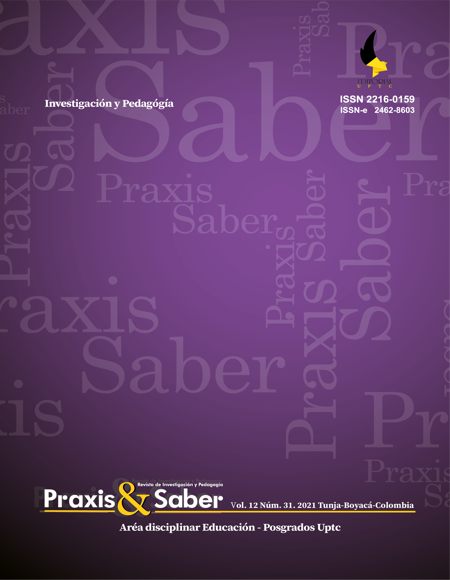Problem-based learning: a proposal for teacher qualification

Abstract
This text describes a research experience of qualification with natural science teachers,
which had the objective of them adopting a strategy of educational work and thus considering alternatives that would favour the development of competences, of critical thinking, and of school scientific knowledge construction; as well as recognizing the value of team work to favour the learning development. The proposal reflects the experience, considerations and suggestions gained during two years of implementation. It was developed based on a staged structure and considered the coherence between the conceptual elements of the problem-based learning strategy and its implementation. The strategy is based on existing documentation in the area but adjusted to the specific context of development. The results revealed the potential of the strategy. The cooperative work, the structuring concepts, and the metacognitive process, among other aspects, are highlighted; but, at the same time, their limitations are recognized regarding the time required for the design of the problem and the implementation of the strategy.
Keywords
problem-based learning, teaching strategy, scientific thinking, critical thinking, teamwork
References
Andreu-Andrés, M., & García-Casas, M. (2006). Evaluación, coevaluación y autoevaluación del trabajo en grupo en la lectura de mapas topográfico. En F. Watts & A. García- Carbonell (Eds.), La evaluación compartida: investigación multidisciplinar (pp. 69-90). Universidad Politécnica de Valencia.
Bruner, J. (2008). Acción, pensamiento y lenguaje. Alianza Editorial.
Cohen-Schotanus J., Muijtjens A., Schonrock-Adema J., Geertsma, J., & Vleuten van der, C. (2008). Effects of conventional and problem-based learning on clinical and general competencies and career development. Med Educ, 42(3), 256-265. https://doi.org/10.1111/j.1365-2923.2007.02959.x
Coll, C. (1998). La teoría genética y los procesos de construcción del conocimiento en el aula. En J. Castorina, C. Coll A. Diáz Barriga, F. Díaz Barriga Areco; B. García; G. Hernández; L. Moreno Armella; I. Muriá, A. Pessoa; C. Vasco. Editores., Piaget en la educación. Debate en torno a sus aplicaciones (15-52). Paidós, UNAM.
Díaz, J. (2009). Guía práctica de lectura crítica de artículos científicos originales en ciencias de la salud. Instituto Nacional de Gestión Sanitaria. https://www.sepeap.org/wp-content/uploads/2015/06/Guia_practica_de_lectura.pdf
Garcés, J., & Duque, J. (2007). Metodología para el análisis y la revisión crítica de artículos de investigación. Innovar, 17(9), 184-194. http://www.scielo.org.co/pdf/inno/v17n29/v17n29a11.pdf
Henao-Arias, J., Vanegas-García, J., & Marín-Rodríguez, A. (2017). La enseñanza en vilo de las emociones: una perspectiva emocional de la educación. Educación y Educadores, (3), 451-465. https://doiorg/10.5294/edu.2017.20.3.7
Johnson, D., Johnson, R., & Smith, K. (1991). Active learning: cooperation in the college classroom. Interaction Book Company.
Jonassen, D. (2000). El diseño de entornos constructivistas de aprendizaje. En C. Reigeluth, (Ed.), Diseño de la instrucción. Teoría y modelos. ( 225-250) Aula XXI Santillana.
Kabalen, D. (2012). Análisis y pensamiento crítico para la expresión verbal. Editorial Digital Tecnológico de Monterrey. https://www.editorialdigitaltec.com/materialadicional/ID371_
Krulik, S., & Rudnik, J. (1980). Problem solving in school mathematics. National Council of Teachers of Mathematics.
López, M. (2008). El aprendizaje basado en problemas. Una propuesta en el contexto de la educación superior en México. Tiempo de Educar, 9(18), 199-232. https://www.redalyc.org/pdf/311/31111811003.pdf
Oakley, B., Hanna, D., Kuzmyn, K., & Felder, R. (2007). Best practices involving teamwork in the classroom: Results from a survey of 6435 engineering student respondents. IEEE Transactions on Education, (50), 266-272. http://www4.ncsu.edu/unity/lockers/users/f/felder/public/Papers/OakleyPaper(IEEE).
Pérez, J., Baños, J., Calafell, F., Carrió, M., & Larramona, M. (2007) Introducción del aprendizaje basado en problemas en la titulación de Biología de la Universidad Pompeu Fabra. En Centro de Innovación y Documentación Educativa. Premios Nacionales de Innovación Educativa 2006 (pp. 93-111). Ministerio de Educación y Ciencia.
Polya, G. (1980). Cómo plantear y resolver problemas. Trillas.
Poot-Delgado, C. (2013). Retos del aprendizaje basado en problemas. Enseñanza e investigación en psicología, 18(2), 307-314. https://www.redalyc.org/pdf/292/29228336007.pdf
Pozo, J. (2006). La nueva cultura del aprendizaje en la sociedad del conocimiento. En J. Pozo, N. Scheuer, M. Pérez, M. Mateos, E. Martín, & M. de la Cruz (Eds.), Nuevas formas de pensar la enseñanza y el aprendizaje: las concepciones de profesores y alumnos (pp. 29-54). Graó.
Prince, K., Eijs van, P., Boshuizen, H., Vleuten van der, C., & Scherpbier, A. (2005). General competencies of problem-based learning (PBL) and non-PBL graduates. Med Educ, 39(4), 394-401. https://doi.org/10.1111/j.1365-2929.2005.02107.x
Quintero, L., Ávila, J., & Olivares S. (2017). Desarrollo del pensamiento crítico mediante la aplicación del Aprendizaje Basado en Problemas. Psicología Escolar e Educacional. 21(1), 65-77. https://doi.org/10.1590/2175-3539201702111072
Rhem, J. (1998). Problem-based learning: An introduction. The National Teaching and Learning Forum, 8(1), 1-4.
Schön, D. (2002). La formación de profesionales reflexivos. Hacia un nuevo diseño de la enseñanza y el aprendizaje en las profesiones. Paidós.
Short, K., Choroeder J., Laird, J., Kauffman, G., & Ferguson. (1999). El aprendizaje a través de la indagación. Gedisa Editorial.
Sola, C. (2006a). Fundamentos de la técnica didáctica ABP. En M. Porres, C. Sola, R. Gentil, L. Epstein, G. Lapuente, S. Limón, F. Sierra, L. Neri, M. McCoy, J. Álvarez, L. Delgado, & F. Illescas (Eds.), Aprendizaje basado en problemas: de la teoría a la práctica (pp. 37-50). Trillas.
Sola, C. (2006b). Ventajas y desventajas de ABP: A modo de final. En M. Porres, C. Sola, R. Gentil, L. Epstein, G. Lapuente, S. Limón, F. Sierra, L. Neri, M. McCoy, J. Álvarez, L. Delgado, & F. Illescas (Eds.), Aprendizaje basado en problemas: de la teoría a la práctica (pp. 188-201). Trillas.
Talbert-Johnson, C., & Oberlander, J. (2004). Teachers in the Trenches: Teacher Education, Technology Integration and the Creation of Technology-Enhanced Environments. Teacher Education and Practice, 17(1), 29-44. https://www.learntechlib.org/p/71516/.
Torres, J.(2015). Sin muros en las aulas. El currículo integrado. En Ensayos sobre el currículo: teoría y práctica. J. Gimeno Sacristán; M, Santos Guerra; J. Torres Santomé, J. Marrero: P. Jackson. (148-169) Editorial Morata.
Torres, J., & Perera, V. (2010). La rúbrica como instrumento pedagógico para la tutorización y evaluación de los aprendizajes en el foro online en educación superior. Revista de Medios y Educación, (36), 141-149. https://www.redalyc.org/pdf/368/36815128011.pdf
Vygotski, L. (1993). Pensamiento y lenguaje. En A. Zaporozhéts (Comp.), Obras Escogidas. Tomo 2 (pp. 9-348). Visor.
Wenger, E. (2000). Communities of Practice: Learning, Meaning and Identity. Cambridge University Press
